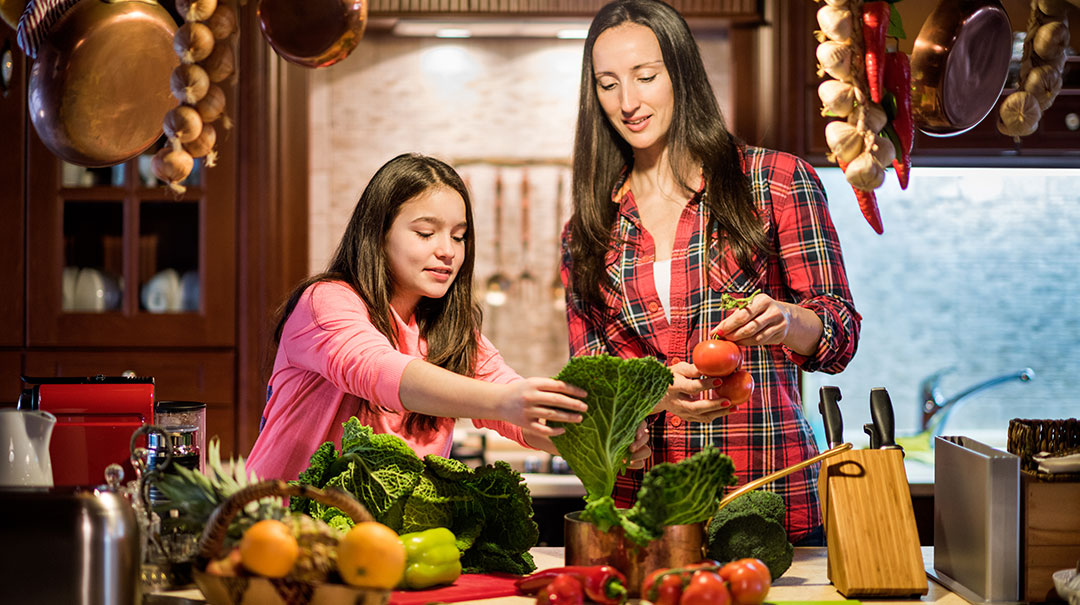While there’s no one magic food that can completely protect you against cancer, research suggests that there are certain foods that, when included in your diet, can lower your risk of developing cancer. What’s even more interesting is that evidence suggests that the synergy of vitamins, minerals, and phytochemicals in your overall diet offers the strongest cancer protection, according to the American Institute of Cancer Research.
What does that mean? That eating a well-rounded healthy diet (that includes the foods in this article) on daily basis will give you the best protection. The other important factor in keeping cancer risk down is to decrease excess body fat. Too much adipose (fat) tissue can increase the risk of 11 different cancers! The foods below can also help with weight management, so read on to see what you should add to your grocery list.
Cruciferous Vegetables
Your mom told you to “eat your greens” for a very good reason. The cruciferous group includes two types of vegetables, green leafy varieties such as kale, spinach, collard greens, and flower-type plants, such as broccoli, cauliflower, Brussels sprouts, rapini or broccoli rabe, cabbage, and turnips.
These special vegetables have been well studied, and research shows that individuals with diets high in these types of vegetables have lower rates of colorectal and certain oral cancers. Compounds called glucosinolates are found in all cruciferous vegetables, and are believed to play a role in reducing cancer risk.
- Prep Tip: Steam, microwave, stir-fry, or sauté to retain the important phytochemicals and vitamins in these foods. Boiling greens in a pot of water can cut content of the beneficial substances in half.
Flaxseed
This tiny seed is packed with dietary fiber, omega-3s, and Vitamin E. At least partly due to its high fiber content, the evidence is convincing that flaxseed can lower the risk of colorectal cancer. One theory is the fiber is used by healthy bacteria in the colon to produce substances that may protect colon cells.
Flaxseed also may contribute to lower overall cancer risk because the fiber creates a satiating effect, which in turn may help with weight control. To be sure to get all the health benefits from flaxseed, do not consume them whole. Instead, buy the whole seeds and grind every week in a coffee or spice grinder to make sure you are getting the freshest dose.
- Prep Tip: Sprinkle ground flaxseed on salads or on top of cooked vegetables for a nutty flavor.
Cranberries
This bright fruit is a great source of vitamin C, dietary fiber, and is also high in antioxidants. One serving of cranberries provides at least 10 percent of the recommended daily amount of fiber. Research on this suggests that cranberries can play a role in decreasing the risk of colorectal cancer as well as decreasing the risk of lip, mouth, tongue, and other aerodigestive cancers (cancers involving the respiratory and digestive tracts).
Part of what gives this food its cancer-fighting powers is flavonoids called anthocyanins, which give this tasty fruit its rich red color. Remember that cranberry juice and whole cranberries will not deliver the same benefits, cranberry juice contains little to no fiber and usually includes added sugar.
- Prep Tip: Add one tablespoon of dried cranberries to cereal, oatmeal or plain yogurt.
Garlic
Garlic’s anti-cancer quality appears to stem from its allyl sulfur compounds and phytochemicals. Most of the research related to garlic and cancers have focused on colorectal and stomach. Yet emerging research suggests garlic may also play a role in the prevention of other cancers. Its cancer-fighting abilities are thought to work in multiple ways, such as inhibiting enzymes that activate cancer-causing agents, boosting enzymes that detoxify carcinogens slowing growth of cancer cells, and limiting cancer’s ability to spread by decreasing tumor’s ability to grow new blood vessels.
In animal studies, garlic compounds stimulate breakdown of testosterone and slow development of prostate cancer. In some human studies, when researchers compared people who consumed high amounts of garlic to those that consumed little, they noticed a reduction in risk of cancers of the esophagus, pancreas, breast, endometrium, and prostate.
- Prep Tip: Allow crushed or chopped garlic to stand for about 10 minutes before cooking. This allows time for the enzymes to produce the bioactive compound thought to hold the anti-cancer benefit.
For delicious, healthy, and inventive recipes from the American Institute for Cancer Research, visit AICR.org/HealthyRecipes.
Want to receive nutrition advice from one of our experts?
Click below to learn more about our nutrition counseling services.
Learn More

